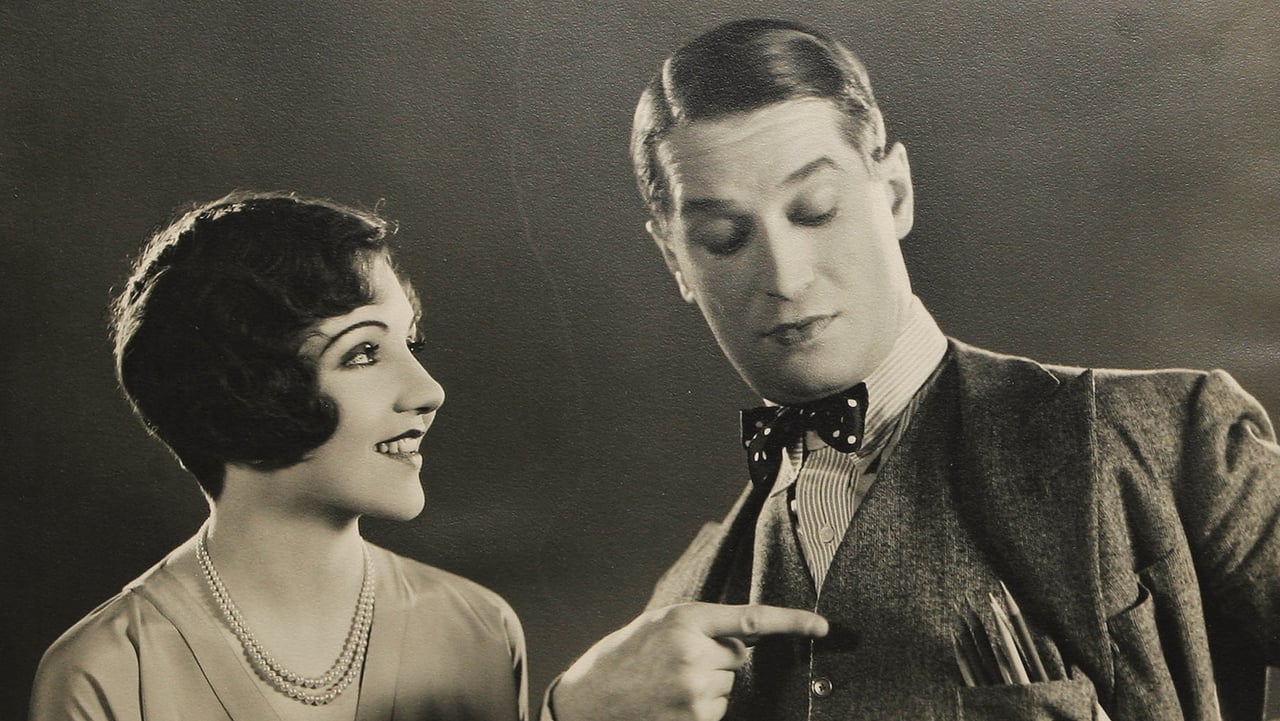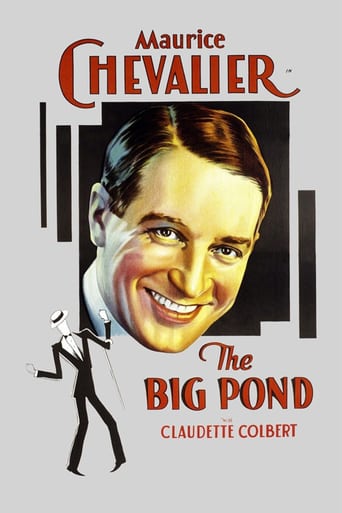



not horrible nor great
Tells a fascinating and unsettling true story, and does so well, without pretending to have all the answers.
View MoreAt first rather annoying in its heavy emphasis on reenactments, this movie ultimately proves fascinating, simply because the complicated, highly dramatic tale it tells still almost defies belief.
View MoreThis film is so real. It treats its characters with so much care and sensitivity.
View MoreSongs (both Chevalier): "You Brought a New Kind of Love to Me" by Irving Kahal, Pierre Norman and Sammy Fain; "Livin' in the Sunlight, Lovin' in the Moonlight" by Al Lewis and Al Sherman. Sound recording: Ernest F. Zatorsky. Producer: Monta Bell.Copyright 6 May 1930 by Paramount Pictures. 6,984 feet. 77 minutes. New York opening at the Rialto: 17 May 1930. [Available on a 7/10 VintageFilmBuff DVD. Contemporary reviewers drew attention to poor sound in the Venice scenes, do don't blame VFB!COMMENT: A delight! Alas, in the English version, Chevalier has only two songs (there are four in the French version, La Grande Mer) and the charming Colbert does not have much of a role, but Maurice, of course, is a constant joy as he runs riot in a chewing gum factory and befriends a really entrancing little boarding-house slavey, Elaine Koch. Preston Sturges has contributed some witty dialogue, and production values are top-drawer. The movie opens promisingly in Venice with Chevalier as a singing gondolier. When he delivers Claudette back to her home away from home, however, our enjoyment slips as George Barbier rushes all over the set. The camera manages to follow him, but the sound mikes cannot. Fortunately, the directors evidently decided not to repeat this experiment. Once the action moves back to the U.S.A., Barbier stops running and the sound recording settles down.
View MoreI can't think of a film that visibly shows an advertisement for ex-lax, that is, not until now. You won't need any to enjoy this delightful pre-code comedy with songs, an elegant romance featuring Maurice Chevalier and Claudette Colbert, two native French legends, in the first of two films they made together. Chevalier, then at the top of his romantic height, scored an Oscar nomination for this, and his easy going persona makes him truly likable. Back in the early 1980's, I saw a screening of 1934's "The Merry Widow" where 75 plus year old ladies cooed like school girls just by his very presence. Colbert, a French transplant at the age of 3, is ultra American chic as the daughter of an imperious wealthy industrialist (the equally portly George Barbier). She is first seen being serenaded by Chevalier to the lyrics of one of his biggest hits, "A New Kind of Love" (later spoofed by ALL of the Marx Brothers in "Monkey Business"), and you can see in those big eyes of hers everything she's thinking. As Colbert indicated in later years, there was more heat in the insinuations of sex than the actual deeds shown in movies from the 1960's on.Thanks to Colbert, the talented but broke Chevalier gets a job working at her father's factory, getting a room in a local boarding house. The unbilled actress playing the down to earth landlady ogles him just like the old ladies did at that screening I attended all those years ago. Nat Pendleton is very funny as the tough guy who is won over by Chevalier's down to earth manner. The plot line basically surrounds the differences in their class, other romantic obstacles that create unwarranted jealousies, and of course, their own egos. Chevalier finally impresses Barbier by inventing an alcohol flavored gum, adding more amusing complications. It's a simple story, played with charm, sophistication and humanity, with two beautiful stars who are equally as talented.
View MoreOriginally planned to highlight the talents of another up and coming Paramount player, Charlie Ruggles, it was quickly adapted to Maurice Chevalier's larger than life talent when "The Love Parade" proved such a big hit!! Chevalier proved he was completely at home in both light operetta and contemporary comedy with songs and "The Big Pond" gave him one of his standards - "You Brought a New Kind of Love to Me" which in 1930 instantly joined "Louise" in his repertoire, the fact that it was played endlessly throughout the film didn't worry anyone.Chevalier played Pierre Mirande, an immigrant determined to make good and trying to cope with a snooty American family - and who did Paramount get to play Barbara, a typical American girl, why Claudette Colbert of course, who was almost as French as Maurice!! Newly hired dialogue director Preston Sturges not only rewrote the dialogue (it was taken from a 1928 Broadway play that lasted 47 performances), he altered the plot and characterizations so it resembled his own Broadway hit "Strictly Dishonourable".Within minutes Pierre has confessed to Barbara Billings that "You Brought a New Kind of Love to Me". She is an American heiress caught up in the heady atmosphere of Venice but of course her father and Ronnie, her would be suitor, believe Pierre is a fortune hunter. They hatch a scheme to bring Pierre to America and completely discourage him by working him to a frazzle in the Billings Chewing Gum Factory. Back in New York Barbara assumes that Pierre is being treated with kingly respect but sneaky Ronnie has directed him to a seedy boarding house but is dismayed to see his French charm and good humour make him a real favourite with all the tenants - especially the land lady. His breezy spirits and hard work in the factory gradually thaw the hard hearted father and when Pierre hits upon the idea of creating an alcohol flavoured chewing gum (after a factory accident) the sky's the limit. Barbara is less than impressed as she sees her light hearted lover turn into a workaholic businessman but Pierre hasn't really changed - he is just trying his best to earn the $20,000 a year that Ronnie hinted he needed to win his girl!!This satire on big business was a bit of a come down from the scintillating "The Love Parade". Funniest scenes were those that kidded Chevalier's confusion with American slang, especially at the boarding house dinner which ends with him being considered a regular guy by his fellow workers. At a presentation he launches into a typical "sing to the audience" song with the bubbling "Living in the Sunlight, Loving in the Moonlight" and just before the end he can hardly contain himself as he sings "Lucky Day" (he sings it to Jenny. She is a little girl at the boarding house and there is a really sweet interplay between them). For me, they are the only scenes that the Chevalier exuberance really shines through and I think they are the high point of the movie.Claudette Colbert does nicely as the love interest, she even sings a bit, but she is not over taxed and seems to disappear during the last half of the movie.Recommended.
View MoreFor his fourth film in America with Paramount, Maurice Chevalier was given Claudette Colbert as his leading lady, a woman who was also born in France. He's once again a Gallic charmer, this time using his charms as a tour guide in Venice. When Claudette is over in Europe with parents George Barbier and Marion Ballou, she falls head over heels for Chevalier. He's so unlike the men she's known in America, especially the dullard that works for dear old dad and wants to marry her, Frank Lyons.But Barbier ain't real happy with the prospect of Chevalier as a son-in-law as he considers Chevalier a fortune hunter. But we bring back to the USA and put him to work learning dad's business. Barbier is the chewing gum king of America. And I thought that honor belonged to the Wrigley family.Maurice starts right at the bottom in the factory and foreman Nat Pendleton is told not to ease up on him by any means. But when Chevalier accidentally spills some bootleg rum on a vat of chewing gum and creates a new flavor, he's proclaimed a genius.Chevalier was nominated for Best Actor for this role and for The Love Parade, but he lost to George Arliss for Disraeli. I don't think The Big Pond is anywhere near as good as The Love Parade, but it has its moments. Maurice got two hit songs from the score of The Big Pond, You Brought A New Kind Of Love To Me and Living In The Sunlight Loving In the Moonlight. The former you may remember served as the title of a film that starred Paul Newman and Joanne Woodward and the song was sung over the opening credits by Frank Sinatra. But it gained even more lasting success only a year later in the Marx Brothers comedy Monkey Business when Harpo 'sang' the song with a Victrola and Chevalier's 78 RPM record strapped to his back as the brothers were disembarking a ship.Claudette sparkles as the leading lady and she shows more than a trace of the comic talent that would burst four years later in It Happened One Night. And George Barbier who is a favorite character actor of mine plays another exasperated father concerned for his daughter, a part he would patent over his career.I wonder though, did the Wrigley family ever think marketing rum flavored gum at Cubs games?
View More